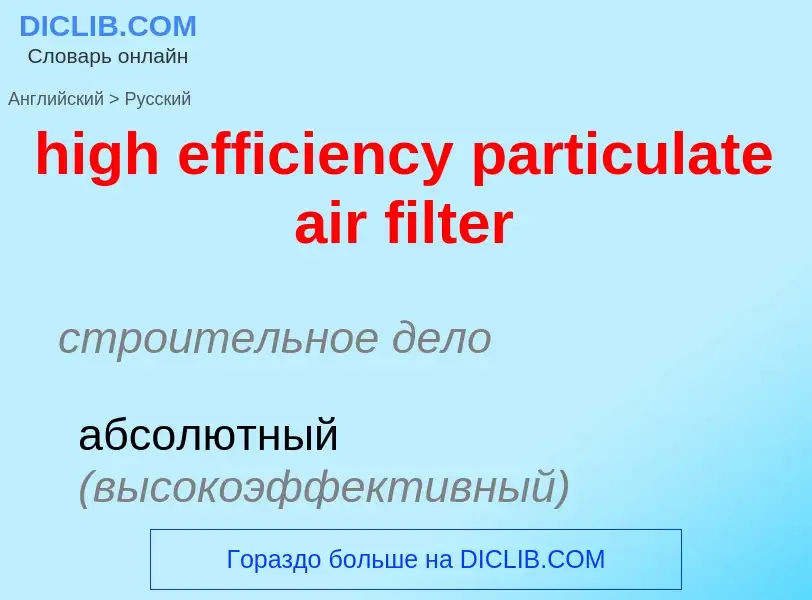Tradução e análise de palavras por inteligência artificial ChatGPT
Nesta página você pode obter uma análise detalhada de uma palavra ou frase, produzida usando a melhor tecnologia de inteligência artificial até o momento:
- como a palavra é usada
- frequência de uso
- é usado com mais frequência na fala oral ou escrita
- opções de tradução de palavras
- exemplos de uso (várias frases com tradução)
- etimologia
high efficiency particulate air filter - tradução para russo
строительное дело
абсолютный (высокоэффективный) воздушный фильтр
Definição
Wikipédia
HEPA (, high-efficiency particulate air) filter, also known as high-efficiency particulate absorbing filter and high-efficiency particulate arrestance filter, is an efficiency standard of air filters.
Filters meeting the HEPA standard must satisfy certain levels of efficiency. Common standards require that a HEPA air filter must remove—from the air that passes through—at least 99.95% (ISO, European Standard) or 99.97% (ASME, U.S. DOE) of particles whose diameter is equal to 0.3 μm, with the filtration efficiency increasing for particle diameters both less than and greater than 0.3 μm. HEPA filters capture pollen, dirt, dust, moisture, bacteria (0.2-2.0 μm), virus (0.02-0.3 μm), and submicron liquid aerosol (0.02-0.5 μm). Some microorganisms, for example, Aspergillus niger, Penicillium citrinum, Staphylococcus epidermidis, and Bacillus subtilis are captured by HEPA filters with photocatalytic oxidation (PCO). A HEPA filter is also able to capture some viruses and bacteria which are ≤0.3 μm. A HEPA filter is also able to capture floor dust which contains bacteroidia, clostridia, and bacilli. HEPA was commercialized in the 1950s, and the original term became a registered trademark and later a generic trademark for highly efficient filters. HEPA filters are used in applications that require contamination control, such as the manufacturing of hard disk drives, medical devices, semiconductors, nuclear, food and pharmaceutical products, as well as in hospitals, homes, and vehicles.


![Hospital staff modelling a [[powered, air-purifying respirator]] (PAPR) fitted with a HEPA filter, used to protect from airborne or aerosolised pathogens such as [[tuberculosis]] Hospital staff modelling a [[powered, air-purifying respirator]] (PAPR) fitted with a HEPA filter, used to protect from airborne or aerosolised pathogens such as [[tuberculosis]]](https://commons.wikimedia.org/wiki/Special:FilePath/Portable HEPA filter.jpg?width=200)
